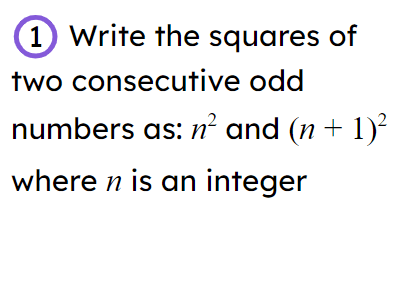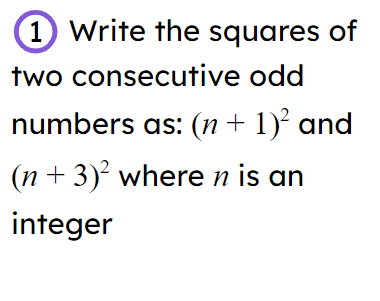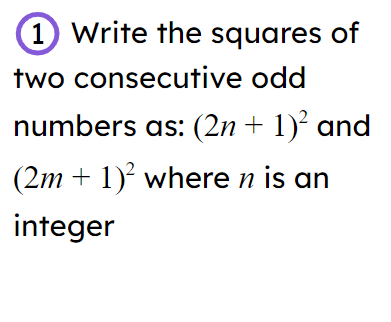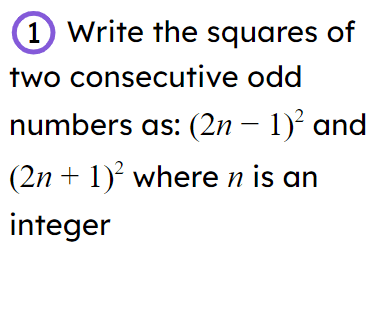Myths about teaching can hold you back


- Year 11•
- Higher
Writing a generalised statement about specific number properties
I can describe a situation using algebraic symbols.


- Year 11•
- Higher
Writing a generalised statement about specific number properties
I can describe a situation using algebraic symbols.
Lesson details
Key learning points
- A conjecture about a generalisation can be expressed algebraically.
- The algebraic expression can be used to test the conjecture.
- Substituting values can reveal whether the conjecture is wrong.
- Substituting values cannot prove the conjecture unless all possibilities are exhausted.
Keywords
Conjecture - A conjecture is a (mathematical) statement that is thought to be true but has not been proved yet.
Generalise - To generalise is to formulate a statement or rule that applies correctly to all relevant cases.
Common misconception
Pupils may think it is acceptable to use the same letter for all expressions.
It may be acceptable for the letter to be the same but that depends on what the letter is representing.
To help you plan your year 11 maths lesson on: Writing a generalised statement about specific number properties, download all teaching resources for free and adapt to suit your pupils' needs...
To help you plan your year 11 maths lesson on: Writing a generalised statement about specific number properties, download all teaching resources for free and adapt to suit your pupils' needs.
The starter quiz will activate and check your pupils' prior knowledge, with versions available both with and without answers in PDF format.
We use learning cycles to break down learning into key concepts or ideas linked to the learning outcome. Each learning cycle features explanations with checks for understanding and practice tasks with feedback. All of this is found in our slide decks, ready for you to download and edit. The practice tasks are also available as printable worksheets and some lessons have additional materials with extra material you might need for teaching the lesson.
The assessment exit quiz will test your pupils' understanding of the key learning points.
Our video is a tool for planning, showing how other teachers might teach the lesson, offering helpful tips, modelled explanations and inspiration for your own delivery in the classroom. Plus, you can set it as homework or revision for pupils and keep their learning on track by sharing an online pupil version of this lesson.
Explore more key stage 4 maths lessons from the Functions and proof unit, dive into the full secondary maths curriculum, or learn more about lesson planning.

Licence
Prior knowledge starter quiz
6 Questions
Q1.Match the number properties with their generalised forms.
Any integer -
$$n$$ where $$n$$ is an integer.
Any odd number -
$$2n + 1$$ where $$n$$ is an integer.
Any positive number -
$$n $$ where $$n > 0$$
Any even number -
$$2n $$ where $$n$$ is an integer.
Q2.Which of these is true for the expression $$4n + 7$$ where $$n$$ is an integer?
Q3.Which of these must be even for any integer value of $$n$$?
Q4.Which of these must be odd for any integer value of $$n$$?
Q5.Which of these represent any two consecutive integers?
Q6.What is the correct expansion of $$(3n-1)^2$$?
Assessment exit quiz
6 Questions
Q1.Which of these represent any 3 consecutive even numbers?
Q2.Which of these could be the general form for any multiple of 5 greater than 10?
Q3.Which of these would be a good first step to prove "The product of any two odd numbers is an odd number"?
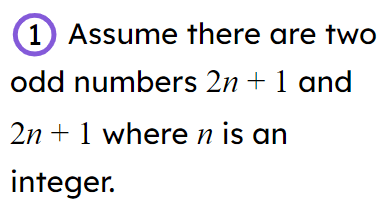
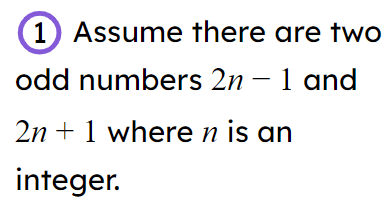
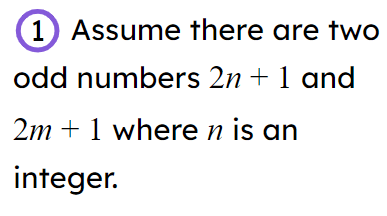
Q4.Which of these would be the best first step to prove "The difference between the squares of consecutive odd numbers is always a multiple of 8"?
